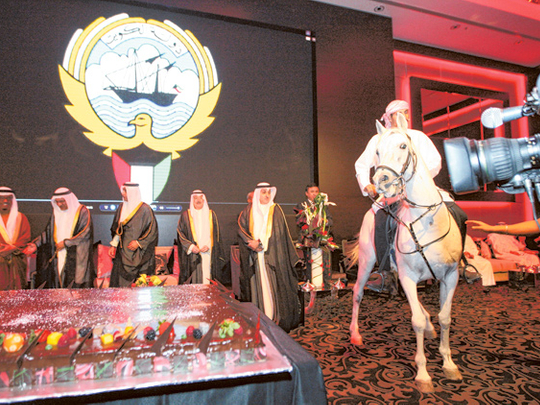
I have been visiting the UAE since the mid-1990s and decided to settle here. During the years that I have lived here, I have had people wondering as to why should a Kuwaiti citizen live outside his country. Many people also mentioned the numerous successes that my country Kuwait is known for since the 1950s — like providing jobs, education and a great health care service to not only its own citizens, but to people from its neighbouring countries as well. Emiratis would tell me stories that they had heard from their parents or grandparents and would express their gratitude to the relationship that existed between Kuwait and the UAE, which had grown into something more intimate than just a political relationship.
All these conversations urged me to further explore this deep relationship — which I was not surprised to know, given the loyal traits that I found within the Emirati community.
I recall a few of the many remarkable events of national celebrations in Kuwait on February 25 and 26, marking the 52nd anniversary of the National Day and the 22nd anniversary of Liberation Day. Throughout that period, numerous incidents portrayed this very special and intimate relationship between the two nations, their governments and people — a relationship defined neither merely by politics nor mutual interests, but one that went beyond to touch the hearts of the people. This relationship, in my opinion, deserves to be recognised and acknowledged when celebrating our National Days.
Looking back at the time before the formation of the Union of the seven Arab emirates and before the independence of the state of Kuwait from the British — when both countries were yet to be recognised as sovereign states — the depth of the relationship between the UAE and Kuwait becomes greatly evident. A number of colleagues told me about their experiences during that period when they were students at various primary schools in Dubai. My Emirati colleagues still remember how the current Emir of Kuwait, Shaikh Sabah Al Ahmad, worked closely with the leadership of the UAE as he was the chairman of the Gulf Aid Committee to oversee the social services and developments here. By 1969, the committee resulted in the establishment of about 43 schools in the UAE with nearly 850 teachers and provided school meals. As we cite cooperation between Kuwait and the UAE in the field of education, we cannot miss remembering the people who had spent their lives in spreading education. Personally, I would recall a great individual like Murshid Al Osaimi, the Kuwaiti merchant, who later was known as a representative of the Kuwaiti government in the field of education and after whom “Souq Murshid” was named.
When looking at the relationship between the two countries in developing and spreading education, I still remember the time when I used to be a college student and how proud I felt every time I passed by a school, hospital or street in the UAE named after the state of Kuwait or one of its renowned citizens. This attitude of Emiratis is no surprise given one’s knowledge that His Highness Dr Shaikh Sultan Bin Mohammad Al Qasimi, Supreme Council Member of the UAE and Ruler of Sharjah, Shaikh Hasher Bin Maktoum and the brothers Taryam and Abdullah Omran, besides many other Emiratis, had lived and studied in Kuwait. It is also worthy of mentioning that these great Emirati examples were amongst the graduates of the first official high school established in Kuwait in 1954.
On a more personal note, I had heard from a Kuwaiti woman about her experience while attending a school in the UAE during the time of the Iraqi invasion. She found it heart-warming to see the Kuwaiti flag being raised next to the UAE flag and listen to the Kuwaiti national anthem being played every morning. The Emiratis did this only to comfort the Kuwaiti children and make them feel at home!
A renowned UAE businessman, Juma Al Majid, had played a very vital humanitarian role during this period, which made him a great role model and he was recently decorated by the Government of Kuwait. Al Majid was part of a committee formed by His Highness Shaikh Mohammad Bin Rashid Al Maktoum, Vice-President and Prime Minister of the UAE and Ruler of Dubai, to look after the Kuwaiti families that had come to the UAE in 1990. In addition, Al Majid volunteered to accommodate the Kuwaiti families in hotels and school buildings until proper accommodations were made for them. All these huge efforts, besides many others, were made when Dubai was still in a state of shock over the passing away of Shaikh Rashid.
I would conclude by mentioning how proud and happy one can be, living in a neighbourhood for seven years and seeing the soldiers every day. That is fascinating to me because I know that the first time the UAE’s military fought a war was not to defend its own land, but to support Kuwait against the Iraqi invasion. As a Kuwaiti citizen, I do not only celebrate the day of liberation of my country, but also hold immense emotions of gratitude towards Emiratis who put themselves in danger to ensure Kuwait got back its freedom.
God bless the people of Kuwait and UAE and happy National Day to my beloved Kuwait!
Saad Abdulla Al Rubaiaan is a Kuwaiti writer living in Dubai.









